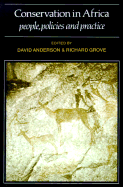Book contents
- Frontmatter
- Contents
- Preface
- List of contributors
- Introduction: The scramble for Eden: past, present and future in African conservation
- Part One Conservation ideologies in Africa
- Introduction
- 1 Early themes in African conservation: the Cape in the nineteenth century
- 2 Chivalry, social Darwinism and ritualised killing: the hunting ethos in Central Africa up to 1914
- 3 Colonialism, capitalism and ecological crisis in Malawi: a reassessment
- 4 Conservation with a human face: conflict and reconciliation in African land use planning
- Part Two Wildlife, Parks and Pastoralist
- Part Three Conservation priorities and rural communities
- Part Four Consequences for conservation and development
- Index
Introduction
Published online by Cambridge University Press: 04 April 2011
- Frontmatter
- Contents
- Preface
- List of contributors
- Introduction: The scramble for Eden: past, present and future in African conservation
- Part One Conservation ideologies in Africa
- Introduction
- 1 Early themes in African conservation: the Cape in the nineteenth century
- 2 Chivalry, social Darwinism and ritualised killing: the hunting ethos in Central Africa up to 1914
- 3 Colonialism, capitalism and ecological crisis in Malawi: a reassessment
- 4 Conservation with a human face: conflict and reconciliation in African land use planning
- Part Two Wildlife, Parks and Pastoralist
- Part Three Conservation priorities and rural communities
- Part Four Consequences for conservation and development
- Index
Summary
Conservation, as the conference discussion of the chapters collected here revealed, means different things to different people. Those working within scientific and technical disciplines tended to see the conservation of Africa's natural resources as a necessary and urgent task in which experts should play a central role. Some emphasised aesthetic and scientific values, as well as man's responsibility to the future, and displayed a certain humility in the confrontation with nature. They warned of the dire long-term consequences of the destruction of particular natural environments and advocated that these be protected. Others felt that the intensity of the demand for resources in rural Africa, and the creeping process of privatisation, would ultimately lead to the failure of protectionist strategies. Conservationists, they argued, should run with the tide. Game would be more securely protected by commercial game farming for meat and hunting; this would also necessitate the preservation of natural habitats in which the animals could survive. In the agricultural sphere, private gain would provide the incentive for longer-term maintenance of soil fertility and watersheds under changing conditions; interventions should be planned accordingly.
But a number of the social scientists raised more fundamental questions about the motivations for and results of conservation policies. Some suggested that major schemes, involving extensive land-use planning, or the reservation of game parks, or controlled irrigated farming, had totally or partly failed because they were insensitive, or directly inimical to the interests of local people (Collett, Chapter 6; Hogg, Chapter 14).
- Type
- Chapter
- Information
- Conservation in AfricaPeoples, Policies and Practice, pp. 15 - 20Publisher: Cambridge University PressPrint publication year: 1988



